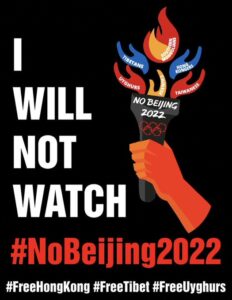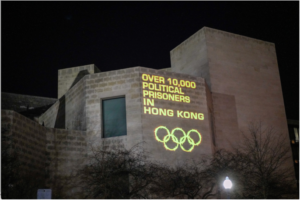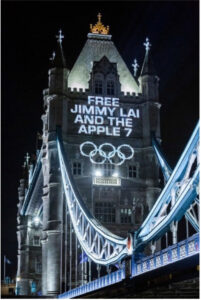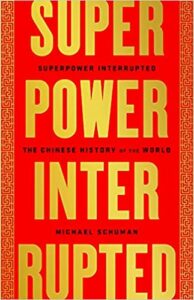Beijing would try “like Germany in 1936” to “use the spectacle” of the upcoming Olympic Games “to win a propaganda victory for its system of strict controls,” according to philanthropist and investor George Soros.
Chinese President Xi Jinping is “the greatest threat to the world’s open societies” and he leads the “most powerful authoritarian state in the world,” he said in an address to the Hoover Institution forum (above) on “China on the Eve of the Olympic Winter Games: Tough decisions for the world’s democracies.”
In contrast to former head of state Deng Xiaoping, Xi is a “true believer in communism” and warned that “Mao Zedong and Vladimir Lenin are his role models,” he told the event, which addressed what the National Endowment for Democracy (NED) calls China’s sharp power.
‘Unbelievable whataboutery’
 Uyghur activist Zumretay Arkin hoped to change the International Olympic Committee’s mind about granting the Winter Olympics to Beijing.
Uyghur activist Zumretay Arkin hoped to change the International Olympic Committee’s mind about granting the Winter Olympics to Beijing.
“I explained how millions of Uyghurs are being arbitrarily detained in concentration camps….. The IOC was told survivors’ stories of rapes and torture, forced sterilization and repression. And about families who have not heard from relatives for years,” she told The Guardian:
“And do you know what the first thing that [the then] IOC vice-president, Juan Antonio Samaranch Jr, said?” She pauses. Shakes her head. “‘The world is a complicated place’.”….. Mandie McKeown, of the International Tibetan Network, was there too. “I remember an Uyghur colleague of mine telling them about her situation, and how she had many family members missing. And the IOC simply turned around and said: ‘Many countries have had bad human rights – look at Guantánamo.’ It was unbelievable whataboutery.”
“Journalists and athletes are heading into a hazardous environment,” says Minky Worden, the director of global initiatives at Human Rights Watch. “And the thing is, no one knows just how hazardous it is. All this is unprecedented in the modern Olympic era.”

Committee for Freedom in Hong Kong
Last night, on the eve of the Olympics, the Committee for Freedom in Hong Kong projected protest images on key buildings in three major cities – the Chinese Embassy in Washington, DC (right), NBC headquarters in New York City, and London’s Tower Bridge (below).
The domestic payoff of the Olympics matters because China will face a trying year in 2022, adds Henry M. Jackson Professor of International Studies at the University of Washington. Xi is seeking an unprecedented third term as general-secretary of the Communist Party. The nation’s economy is slowing. International opposition to China’s human rights abuses and to its aggressive foreign policy is growing.
Xi is hoping that the “bread and circuses” diversionary aspect of the Games will help him overcome the stresses of this year and advance his political standing, he writes for The Conversation.

Committee for Freedom in Hong Kong
In December 2021, when asked about China’s crimes against the Uyghurs, IOC member Dick Pound told a German reporter, “I don’t know enough of the facts.” This is an IOC official, a decorated lawyer no less, asking us to believe he is mostly unaware that one of the globe’s most urgent human rights crises is happening in the host nation of the Olympic Games, notes Omer Kanat, executive director of the Uyghur Human Rights Project.
So, where can we find our voice and agency? he asks in The Diplomat:
- First, we all have a personal stake. China is putting in place a high-tech blueprint for how to get away with genocide…. Everyone is vulnerable when ambitious authoritarians don’t fear consequences for their atrocities.
- Second, we can all participate in a “citizens’ boycott” of Beijing 2022 and refuse to contribute to the fanfare. For a “citizens’ boycott,” I hope people will make the choice not to watch. I’d like to see headlines like: “lowest-ever Olympics viewership” to demonstrate that it doesn’t pay to try to conduct “business as usual” amid atrocity crimes.
- Third, even though their products have become indispensable to our lives, corporations need to hear that complicity in genocide hurts their brand. If corporate logic is all about money, that that is where civil society must engage.

Credit: Badiucao
Where other countries might balk at the financial considerations of putting on these events or be put off by the demands of the organization’s executives, autocrats have little hesitation because there are no constituents to appease or public funding to consider, ESPN’s Sam Borden writes. And while a popular train of thought is that nations like China want to host events such as the Olympics to normalize or ingratiate themselves among the more progressive countries of the world, the truth is that, in today’s world, such theory may be becoming outdated.
“It has very little to do with them wanting to ‘fit in’ with the rest of the world,” Olympic historian David Wallechinsky said. “This is about the Chinese government being able to say to their citizens, ‘Look what we have done. Look what we have brought you. Look what China has accomplished.’ It’s propaganda to them. It’s Olympic propaganda.”
Unfortunate pivot point
And on some deeper level the games might cause some ordinary Chinese people to wonder why the leadership is fixated on parades and congresses and lockdowns instead of reopening the country and returning it to the conditions that has seen it flourish for the past four decades, adds Ian Johnson, Senior Fellow for China Studies at the Council on Foreign Relations. Instead of the start of a glorious new chapter in the Communist Party’s rule, it might go down as a marker in the party’s turn from dynamism to decay.
 As matters stand, the Winter Games could be an unfortunate pivot point, says Michael Schuman, a nonresident senior fellow at the Atlantic Council’s Global China Hub, and the author of Superpower Interrupted: The Chinese History of the World. In 2008, the Olympics foreshadowed China’s rise as a global leader and the great possibilities that could bring; 2022 suggests that a more powerful China will have a more conflicted relationship with the world.
As matters stand, the Winter Games could be an unfortunate pivot point, says Michael Schuman, a nonresident senior fellow at the Atlantic Council’s Global China Hub, and the author of Superpower Interrupted: The Chinese History of the World. In 2008, the Olympics foreshadowed China’s rise as a global leader and the great possibilities that could bring; 2022 suggests that a more powerful China will have a more conflicted relationship with the world.
With the events closed to visiting spectators, the Chinese will stand alone, reveling in their own perceived greatness; the outside world will participate entirely on Chinese terms. Just the way Beijing likes it, he writes for The Atlantic.
Chinese artist Badiucao launched Beijing 2022 (see above), a five-part collection of non-fungible tokens (NFTs) on Tuesday, Newsweek reports. They use the Olympics as imagery to protest China’s oppression, lack of transparency regarding COVID-19 and the dismantling of democracy in Hong Kong, according to the dedicated site for the collection.
In this video introduction to the Nazi Olympics: Berlin 1936, American Jewish athlete Marty Glickman, U.S. Holocaust Memorial Museum Director Sara J. Bloomfield, exhibition curator Susan Bachrach, and German Jewish athlete Gretel Bergmann reflect and remember the 1936 Olympic Games as more than history. Credit: United States Holocaust Memorial Museum.
The Beijing Olympics and the Faces of Repression (above)
On the eve of the Opening Ceremonies of the Beijing Winter Olympics, the Congressional-Executive Commission on China will hold a hearing to give a platform to voices working on behalf of the abused and repressed in China, including civil society, human rights defenders, the people of Hong Kong, Uyghurs, and Tibetans. These voices will spotlight political and religious prisoners so the world may hear their stories.
Witnesses: Speaker Nancy Pelosi, U.S. House of Representatives; Panel 2: Yaxue Cao, Founder and Editor of China Change; Nathan Law, Democracy activist; Jewher Ilham, Daughter of Uyghur scholar Ilham Tohti; Sophie Luo, Wife of human rights defender Ding Jiaxi; Nyima Lhamo, Niece of late Tibetan Buddhist leader Tenzin Delek Rinpoche.
Thursday, February 3, 2022. 10:00am-12:00pm. G-50 Dirksen Senate Office Building. Livestreamed on the CECC’s YouTube Channel.







